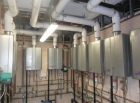Rinnai supplies copious amounts of hot water for health club and spa

To meet a DHW demand of 20 000 l/h the newly built Hale Country Club & Spa in Cheshire has installed 17 continuous-flow water heaters from Rinnai. They were chosen by operator FX Leisure in preference to a storage system, which was judged to be inefficient and expensive. This 5-star club has all-encompassing health and fitness facilities — including luxurious indoor and outdoor wet areas, a selection of contemporary food and beverage offerings, and a sumptuous spa.
The 17 decentralised gas-fired condensing HDC1500i units feed executive soaker showers, poolside showers and changing-room showers. Continuous-flow water heaters producing hot water as required overcome the uncertainties associated with sizing storage capacity for hot water. In many instances, the water heaters feed showers directly, so there is no need for recirculation.
These water heaters are also well suited to infrequent use, such as the football park that is only used at weekends. Four Rinnai heaters have been installed there.
Temperature is controlled to within ±1 K, even with rapidly changing demand.
Water heaters that serve outlets directly can be particularly efficient as they can operate in condensing mode all the time.








